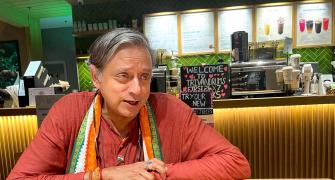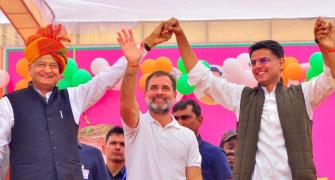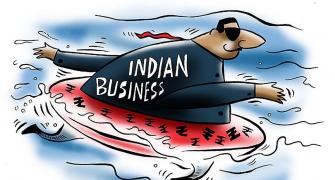The country's external affairs minister publicly disagreeing with the Union's home minister, or at least his ministry? There is nothing new about it. From the days of Prime Minister Jawaharlal Nehru the Union cabinet has seen robust internal debate and public expression of difference of opinion by members of the Union council of ministers.
The differences between Pandit Nehru and the then Union home minister, the greatest home minister of India, Sardar Vallabhbhai Patel, are legendary and the stuff of many books. Sardar Patel was highly skeptical of Pandit Nehru's view of China and made bold to pen down his views.
The differences between today's home ministry and external affairs ministry are not as serious. Forget the clash of the titans. Even lesser mortals have had public spats on policy issues. Sharp ideological differences have of course been part of the Indian National Congress tradition. After all, the Congress Party has always been a coalition of ideas and interests and has never prevented ideological differences from being publicly articulated. Thus, even under Prime Minister Nehru's stern gaze the likes of finance minister Morarji Desai and defence minister V K Krishna Menon clashed on many an issue.
Consider the cabinet of the 'Empress of Modern India', the tough Mrs Indira Gandhi. Debates raged between the Left and the Right in her government, even after the more extreme elements walked out and formed a party of their own. One need not devote too much time to differences within the late Rajiv Gandhi's government. Indeed, within his own office Prime Minister Rajiv Gandhi witnessed sharp Left-Right arguments between the likes of a Mani Shankar Aiyar and a Montek Singh Ahluwalia. There is, of course, no need at all to cite the example of the Deve Gowda and the I K Gujral ministries -- to say they were debating societies would be to proffer a compliment. Their cabinet was a mix between a circus and a wrestling match.
The virtual and real coalition ministries of Prime Ministers Narasimha Rao and Atal Behari Vajpayee had innumerable instances of internal differences being publicly voiced. Indeed, the present battle between North Block (home ministry) and South Block (external affairs ministry) on New Delhi's Raisina Hill mimics to an extent a similar clash of ideologies, interests and styles of the Vajpayee era, when Bharatiya Janata Party 'hardliner' of that time, Lal Krishna Advani, differed with the prime minister and his national security adviser.
Mr Advani took the hard line to differentiate himself from the more liberal prime minister, while today's home minister, P Chidambaram, may well be trying to be the enfant terrible of North Block to force his leaders to change his job. Chidambaram has not made a secret of his desire to either return to the western section of the North Block, the ministry of finance, or to cross the street and move to either foreign affairs or defence. He may well be tired of his portfolio, or may wish to demit it before things go further out of his control in Jammu & Kashmir, the north-east, especially Manipur, and in the Naxal-affected areas.
So is the media making too much of ministerial differences and their public articulation? Partly yes, but partly no. The Manmohan Singh government has been speaking in far too many voices for some time now. Debate should not degenerate into cacophony, dissent need not turn into turf battles. Perhaps the time has come for Prime Minister Manmohan Singh to once again assert his authority. He has been excessively accommodative of ministerial dissidents. May be it's time he cracked the whip.









